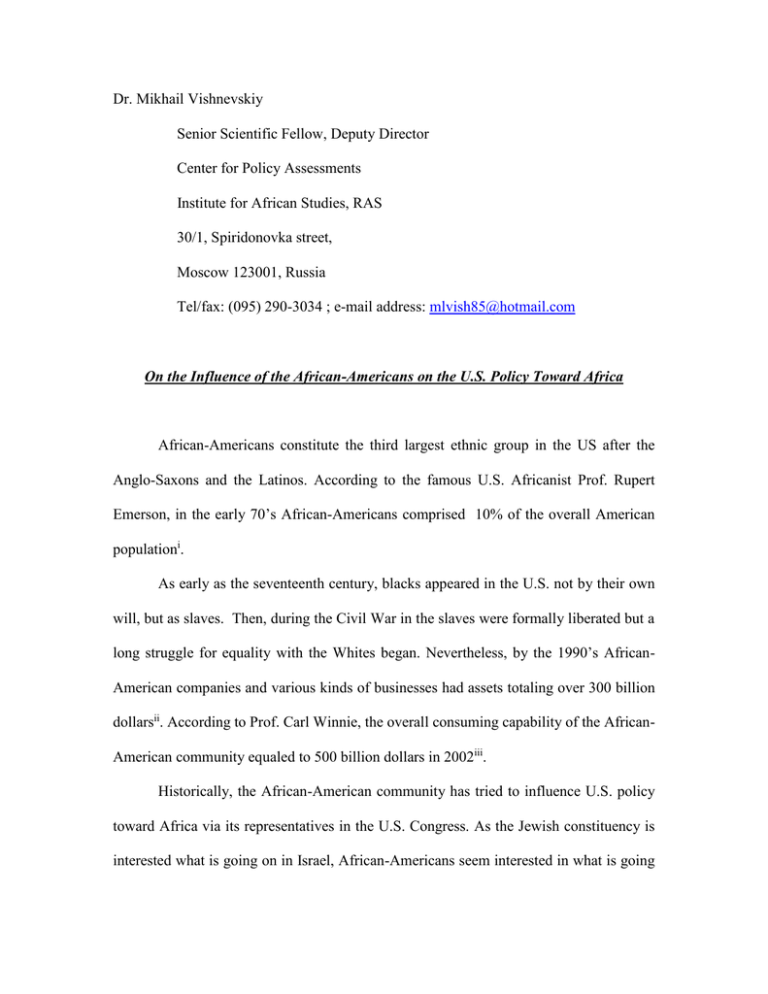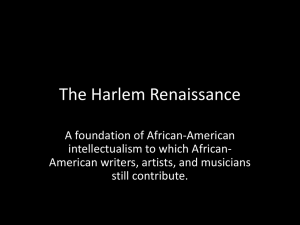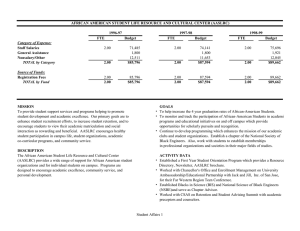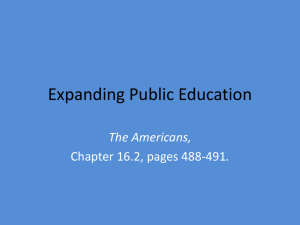Dr. Mikhail Vishnevskiy Senior Scientific Fellow, Deputy Director Center for Policy Assessments
advertisement

Dr. Mikhail Vishnevskiy Senior Scientific Fellow, Deputy Director Center for Policy Assessments Institute for African Studies, RAS 30/1, Spiridonovka street, Moscow 123001, Russia Tel/fax: (095) 290-3034 ; e-mail address: mlvish85@hotmail.com On the Influence of the African-Americans on the U.S. Policy Toward Africa African-Americans constitute the third largest ethnic group in the US after the Anglo-Saxons and the Latinos. According to the famous U.S. Africanist Prof. Rupert Emerson, in the early 70’s African-Americans comprised 10% of the overall American populationi. As early as the seventeenth century, blacks appeared in the U.S. not by their own will, but as slaves. Then, during the Civil War in the slaves were formally liberated but a long struggle for equality with the Whites began. Nevertheless, by the 1990’s AfricanAmerican companies and various kinds of businesses had assets totaling over 300 billion dollarsii. According to Prof. Carl Winnie, the overall consuming capability of the AfricanAmerican community equaled to 500 billion dollars in 2002iii. Historically, the African-American community has tried to influence U.S. policy toward Africa via its representatives in the U.S. Congress. As the Jewish constituency is interested what is going on in Israel, African-Americans seem interested in what is going on in Africaiv. Hence, of the many African-Americans elected to the U.S. Congress, earning influential positions in the Democratic or the Republican Parties, and promoted to high positions in the U.S. Administration, some have worked to strengthen ties between Africa and America. For instance, in 1965 Mr. Paine, a black Congressman, said that Africa is essential to U.S. national strategic interests. In the late 1970’s the former mayor of Atlanta Mr. Andrew Young, as a U.S. Permanent Representative to the UN, participated in the talks with the African leaders and the Rhodesian politicians that resulted in a political settlement of the crisis in Rhodesia, reached at the Lancaster Conference in 1979. Mr. Jessie Jackson, leader of the “Rainbow Coalition,” who twice ran for President of the United States (1984 and in 1988) became, in the 1990’s, a special representative of the U.S. President at the talks with the African leaders, particularly the Nigerian ones. Of particular interest is the organization called Trans Africa founded in 1977 by the Black Leadership Conference on the initiative of the “Black Caucus” in the U.S. Congress. Trans Africa has provided forums for Africans and African-Americans of various political views to discuss their common interests and has lobbied Congress in the interests of the African-American Community and African countries. For instance, in 1986 Trans Africa lobbied Congress to adopt a bill against apartheid practices in South Africa. This bill was formalized as the Comprehensive AntiApartheid Act of 1986. Trans Africa also initiated a number of African-AfricanAmerican summits to discuss some problems of Africa and how the African-American Community could help to solve them. Specifically, in May 1999, heads of 11 African states, influential African-American politicians, and prominent business figures from the US and Africa (total, more than 4,000 individuals) participated in the Accra Summit in Ghanav. Thus, Trans Africa helped to change the image of the African-Americans in Africa: from “the U.S. agents” to desirable partners in political and economic development of African countries. In 1999 the Ghanaian Parliament even offered Ghanaian citizenship to those African-Americans who expressed a willingness to participate in the business life in Ghana.vi In 1998, 1,000 African-Americans worked in 300 South African businesses. In March 2003 a delegation of the African-American businessmen visited Ghana to find out what could be done for the Ghanaian economic growth. During their meeting with the Ghanaian President, they expressed their strong desire to help the “Ancestors’ Motherland.” The results of this visit have further strengthened African-American trade and economic relations with Ghanavii. All the above mentioned achievements show that the development of the “Black Capitalism” in the US is enhancing African-American political resources. It seems that influential African-American politicians are well aware of this trend and base their agendas on it. For instance, Mr. Jessie Jackson remarked that the U.S. is interested in African trade and, politically, America needs African states as its friends or even allies. Strategically the US is interested in cooperating with some countries in Eastern and Western Africa. It is mostly evident now when the struggle against “terrorists” and for the African oil is taking place. As a member of the U.S. official delegation, Jackson proposed his ideas to participants of the UN Conference Against Xenophobia and Racial Discrimination in Durban (South Africa) in August-September 2001. Secretary of State Collin Powell was expected to head the delegation but at the last minute he refused to attend this Conference on decision of President George W. Bush who did not like some provisions of the draft resolution, particularly the one where Zionism was labeled as racismviii. At this Conference Mr. Jackson mainly advocated the reparations issue; he tried to get the African leaders’ support of the idea. Although he got this support, African nations and the African-American Community fought over the lion's share of these funds. The conflict was used by the former colonial powers and the U.S. Administration to avoid making any decision on this critical issue problem. Another conflict at the Conference arose over the formal denunciation of the slave trade. For instance, contrary to the draft resolution where the slave trade was proclaimed a “crime against humanity”ix, the South African, Senegalese and Nigerian delegations decided not to insist on this term; whereas the Namibian, Zimbabwean and Zambian delegates strictly followed the draft versionx. The US and the European countries refused to denounce the slave trade but stated in the Final Declaration that slavery was “ a tragedy” in the history of mankindxi. It was not surprising that African-American representatives left the UN Conference in Durban with hard feelings. The main question – the reparations issue- was not settled. In April 2002, they sued three American insurance companies that allegedly received benefits from the slave trade in the pastxii. As far as I know, the U.S. Court has not decided this case. The reparations issue was again raised at the state level during a visit of the Treasury Secretary O’ Niell to Africa in May 2002. He was accompanied by Mr. Bono, an American singer who seemed to speak on behalf of the African-American Community. During this visit Mr. Bono addressed the governments of the US, Great Britain, Holland, France, Spain, Italy, Belgium and Denmark with a proposal to pay 777 billion dollars to cover the damages caused by the slave trade between 1503 and 1957xiii. From my point of view, this proposal seemed a feasible – this fund is not too big for the overall budgets of the above mentioned countries. At the same time Mr. Bono did not demand all this money in cash – he said that the fund could be used to build hospitals, to supply schools with computers and other equipment, etc.xiv Despite this, I am not convinced that these funds will be ever paid as reparations. The real problem lies not in the financial or economic fields but in the political will. Evidently all these governments do not acknowledge any responsibility for the trans Atlantic slave trade. Nevertheless, the “Unity in Action” program—designed to unify AfricanAmericans and the Africans under the “Africa Needs the US” banner—is led by “Constituency for Africa,” an organization headed by Mr. Michael Foot, who has strong ties with some influential Congressmen in Washington and in the states’ capitals. He organizes various events throughout the U.S. attended by black Congressmen and prominent African leadersxv. Moreover, since 2001 another group of Congressmen headed by Mr. Ronald Dellums has organized round-tables and seminars in Washington for the African diplomats and distinguished African politicians. Their aim is to informally discuss the most acute African problems. For instance, the round-table discussion that took place in September 9-17, 2002 was attended by Prof. Nkulu, the South African Special Advisor for the New Economic Program for African Development (NEPAD). These meetings are sponsored by the members of the Corporate Council on Africa. This particular one was supported by Chevron Texacoxvi. There is one more African-American organization – “Lawyers for Africa”interested in influencing the official policy toward Africa. In March 2003, when the UN Security Council split over the question of whether to invade Iraq or not, the “Lawyers for Africa” addressed the governments of Guinea, Cameroon and Angola (the “ad interim” members of the Security Council at that time) with a request not to endorse military action against Iraq. This organization stated that 81% of the African-Americans were against such measuresxvii. Trans Africa supported this move in a letter addressed to all its friends in Africaxviii. At the same time, African-American Congressmen fully supported President George W. Bush's policy toward the Liberian crisis in Summer 2003. Mr. Edward Cummings, the “Black Caucus” Chairman, addressed the U.S. President with a proposal to arrange a peace-keeping operation in Liberia. He asked him to head it. Also Mr. Cummings expressed his readiness to come to Liberian capital, Monrovia, to organize peace talks including all the combating partiesxix. The influence of the African-Americans on the U.S. policy toward Africa is recognized not only in the US, but in Africa as well. To keep daily contacts with the African-American organizations in the US, the OAU Secretariat. in 1988, established its “Information Bureau” in Washington. It continues to work in close cooperation with the African-American Community. Sometimes the Bureau and the Community arrange joint events. In particular, during President Clinton’s visit to Africa in 1998, they offered proposals, both in the US and in Africa, advocating a greater American role in political and, most of all, in economic sectors in Africaxx. In conclusion, my study suggests that African-Americans have influenced the official policy toward Africa rather effectively. And from my point of view, they can do much more in the future. In particular, their influence upon President George W. Bush's selection of African-Americans to the posts of Secretary of State and of National Security Advisor was unmistakable. Clough M. Free at Last? U.S. Policy Toward Africa and the End of the Cold War. N.Y.: A Council on Foreign Relations Book, 1992. P.29. Jeune Afrique Economie. P. Aout 1998. African Issues. V. XXX/I. New Brunswick: African Studies Association Press, 2002. P.5. African Issues. V. XXX/I. New Brunswick: African Studies Association Press, 2002. P.4. Африка в современном мире и российско-африканские отношения. М.: Институт Африки РАН, 2001. С.63. Глобальные и стратегические исследования (Вып. 1). М.: Институт Африки РАН, 2002. С. 45. The Accra Mail. Accra, March 28, 2003. US Backs Race Conference Stipulations. Sep.1, 2001 (http://www.imadr.org/durban.news.usa.html). The New York Times. 4 September 2001. Ibid. 6 September 2001. The Washington Post. 8 September 2001. www.allafrica.com, 10 April 2002. The Accra Mail, Accra. 24 May 2002. Ibidem. Newsday, N.Y. 8 July 2002. www.allafrica.com, 28 August 2002. www.allafrica.com, 7 March 2003. Trans Africa Forum News. Urgent Action Appeal. 13 May 2003 (http://consumer.mci.com/customer_service/ContactUs.jsp). VOA News. Robinson D. African-American Lawmakers Urge Bush to Send Troops to Liberia. Wash. 26 July 2003. BBC News. L. 24 March 1998. i Clough M. Free at Last? U.S. Policy Toward Africa and the End of the Cold War. N.Y.: A Council on Foreign Relations Book, 1992. P.29. ii Jeune Afrique Economie. P. Aout 1998. iii African Issues. V. XXX/I. New Brunswick: African Studies Association Press, 2002. P.5. iv African Issues. V. XXX/I. New Brunswick: African Studies Association Press, 2002. P.4. v Африка в современном мире и российско-африканские отношения. М.: Институт Африки РАН, 2001. С.63. vi Глобальные и стратегические исследования (Вып. 1). М.: Институт Африки РАН, 2002. С. 45. vii The Accra Mail. Accra, March 28, 2003. viii US Backs Race Conference Stipulations. Sep.1, 2001 (http://www.imadr.org/durban.news.usa.html). ix The New York Times. 4 September 2001. x Ibid. 6 September 2001. xi The Washington Post. 8 September 2001. xii www.allafrica.com, 10 April 2002. xiii The Accra Mail, Accra. 24 May 2002. xiv Ibidem. xv Newsday, N.Y. 8 July 2002. xvi www.allafrica.com, 28 August 2002. xvii www.allafrica.com, 7 March 2003. xviii Trans Africa Forum News. Urgent Action Appeal. 13 May 2003 (http://consumer.mci.com/customer_service/ContactUs.jsp). xix VOA News. Robinson D. African-American Lawmakers Urge Bush to Send Troops to Liberia. Wash. 26 July 2003. xx BBC News. L. 24 March 1998.




